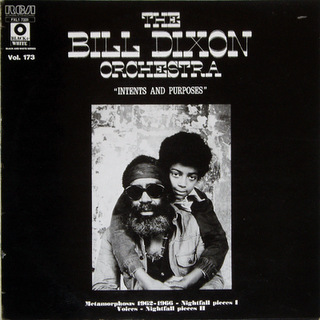
I'm unsure what attracts me towards free jazz sometimes. There's the unbridled creativity, of course, and the 'living-in-the-moment' spontaneity that I try to live by myself. But that doesn't change the fact that much of it sounds just plain odd. I'm a fan of unusual instrumentation (see the recent post about Dorothy Ashby for example) so was delighted to pick up this Bill Dixon album. It's credited to the Bill Dixon orchestra, which tells you a lot already about the instrumentation. There's a horn section - Dixon himself on trumpet and flugelhorn, then a couple of reeds (alto sax, bass clarinet) and a couple of brass (bass trombone, english horn) - that's hardly conventional, as well as a cello, bass and various percussion. It's looking pretty odd already, and that's before you consider Dixon's arrangements.
Arrangements? Yes, despite being loosely attached to the free-jazz genre, Dixon's music is much more considered than that genre suggests. Of note is the presence of several bass instruments on these pieces - as a result the music often has a dark, brooding quality (once again at odds with the preconceived ideas that people have about free music). Dixon's music is always full of space, and his improvisational style reminds me a little of contemporary Don Cherry, although perhaps a little more considered - maybe with a splash of 'In A Silent Way'-era Miles?
Dixon was arguably one of the main driving forces behind the development of free jazz. After meeting Cecil Taylor (recording with him on 'Conquistador!'), Dixon became involved with the free jazz community and funded (although didn't play with) The New York Contemporary Five. He also briefly played in a quartet with Archie Shepp that released one album in 1962. Despite these associations though, Dixon went very much his own way in terms of his recordings. After this album was released in 1967, he didn't record again until 1980, but has been a regular in the studio since then. He favours smaller groups now, but the brooding atmosphere of 'Intents...' remains thanks to his use of two basses on many recordings.
Dixon's discography can be found here although many of his recordings are difficult to find.


2 comments:
In the past couple of months there was a big argument going on on www.bagatellen.com about Dixon in the comments section of a couple of posts, starting with one about Dixon's birthday.
The music for Intents and Purposes was largely written out. Ask Bill now and he will tell you that, at the time, this was the only way that he could be sure to get what he wanted from the musicians.
Bill is still composing for orchestra, and we just performed and recorded a new work for chamber orchestra (16 players)at this years Vision Festival.
Stephen Haynes
www.stephenhaynes.blogspot.com
Post a Comment